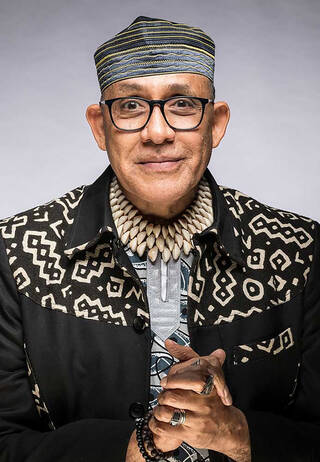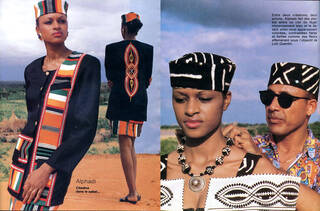
Alphadi (born Sidahmed Alphadi Seidnaly) uses his designs to showcase and celebrate the beauty of the African continent, its rich histories and cultures. Apprenticed to master couturier Mister Ouseman Chirfi between the ages of seven and twelve, he learnt fashion design at an early age and later studied at the Atelier Chardon Savard, Paris. With global ambition, he has opened boutiques all over the world, including in Casablanca, New York, Accra, and locations in Martinique and Spain.
In 1998 he founded the Festival International de la Mode Africaine (International Festival of African Fashion) or FIMA, supported by UNESCO. The first event, hosted in the Tiguidit desert in Niger, included designers such as Chris Seydou, Pathé'O, Oumou Sy, Yves Saint Laurent and Kenzō. Over 5,000 people from more than 52 countries flew to the desert to witness Alphadi's fashion and culture extravaganza.
Alphadi's work draws upon cultures and design practices from across the continent. Kuba cloth – originating from the ancient Kuba kingdom of central Africa – is a common feature in his collections. It is made from woven raffia, with the intricate decoration achieved through cut-pile embroidery. Designs are stitched onto the cloth and then raffia fibre is drawn through with a needle and snipped with a knife to make a dense pile, creating a plush, velvet-like effect.

It was important for me to show the beauty of the African continent ... [to] show the diversity of our cultures and the strong history of each of them ... I want to be able to represent them all but it will take a couple of lives. One continent, 54 countries ... Every African has a different story to tell.
This dress was created as a homage to Tuareg jewellers and their historic metalwork practices. Inspired by the strength of women, the metal breastplate represents the woman as a warrior, the harsh metal contrasting with a billowing layer of printed cotton cloth.

Using a strip of Téra-Téra cloth on the jacket, Alphadi updates this classic skirt suit. A handwoven fabric traditionally made in Tera, Niger, this vibrant cloth is used historically to cover brides on their wedding day. Alphadi references this history, creating a design to represent a strong woman, fully independent and dynamic, pursuing her dreams.

From hats to waistcoats, Alphadi is regularly seen wearing his own designs. He often wears a shallow, rounded hat decorated with embroidery – a style which is popular in many regions in Africa – known variously as the hula, fílá or kofi.

Discover more about the Africa Fashion exhibition.






